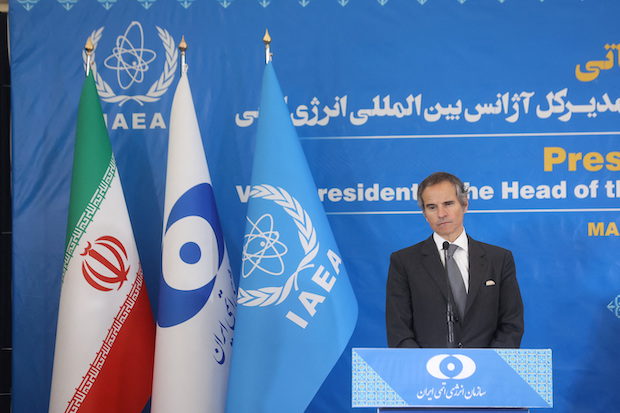
International Atomic Energy Agency (IAEA) Director General Rafael Grossi looks on during a news conference with the head of Iran’s Atomic Energy Organization Mohammad Eslami as they meet in Tehran, Iran, March 4, 2023. (Majid Asgaripour/ West Asia News Agency via Reuters)
The head of the International Atomic Energy Agency said on Saturday talks were ongoing with Iran on two sets of important matters, including the science sector, and there was “great expectation” about the process.
Rafael Grossi began meetings in Tehran on Friday that diplomats said were meant to push Iran to cooperate with an IAEA investigation into uranium traces found at undeclared sites that had been enriched close to nuclear-weapons grade.
“Globally speaking, there are two sets of matters that are important. Clearly, there is great expectation about our joint work in order to move forward in the issues that Iran and the agency are working on, to clarify and to bring credible assurances about the nuclear program in Iran,” Grossi told reporters in Tehran.
“The second set of issues, which is very important, has to do with (the) scientific, technical cooperation we are having and will continue to have with Iran,” he said, speaking alongside Mohammad Eslami, head of the Atomic Energy Organization of Iran.
Grossi said the talks were taking place in an “atmosphere of work, honesty, and cooperation.”
His visit comes amid contacts with Tehran on the origin of the uranium particles enriched to up to 83.7% purity, very close to the 90% threshold for weaponization, at its underground Fordow enrichment plant, according to a report by the UN nuclear watchdog seen by Reuters.
Joint agenda
Eslami told reporters on Saturday that the Islamic Republic was enriching uranium up to 60% fissile purity.
Grossi later met President Ebrahim Raisi and “expressed satisfaction with achieving a joint agenda with the Atomic Energy Organization on measures to smooth the path of cooperation,” Raisi aide Mohammad Jamshidi tweeted.
Raisi added that “cooperation is a bilateral matter, which could continue based on maintaining the independence of the IAEA and the rights of the Iranian nation,” Jamshidi added.
Iran often accuses the IAEA of being manipulated by the West and Tehran’s arch-foe Israel and disregarding the Islamic Republic’s right to develop a peaceful nuclear program. The IAEA rejects the accusations.
Under a 2015 agreement with six world powers, Iran curbed its disputed uranium enrichment program in return for relief from international sanctions. But the accord began to unravel in 2018 after then-US President Donald Trump pulled out and reimposed tough US sanctions on Iran, prompting Tehran to start violating the deal’s strict limits on enrichment.
Iran’s stonewalling of a years-long IAEA investigation into uranium traces found at three undeclared sites prompted the United Nations watchdog’s 35-nation Board of Governors to pass a resolution at its last quarterly meeting in November ordering Tehran to cooperate urgently with the inquiry.
That cooperation has not materialized and Grossi hoped the meeting with hardline President Raisi would help smooth the way towards ending the deadlock, diplomats in Europe said. The board’s next quarterly meeting starts on Monday.
Grossi said it was an “issue of necessity to have a very deep, serious, systematic dialogue with Iran. This is why I am here. It’s been too long.” He said he would “judge our degree of satisfaction at the end of the day.”